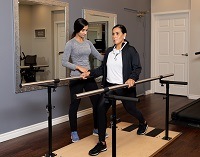 Cambridge Consultants and Helius Medical Technologies have confirmed their “groundbreaking” Portable Neuromodulation Stimulator (PoNS) device—developed for the short-term treatment of gait deficit due to mild-to-moderate symptoms from multiple sclerosis (MS)—has received marketing authorisation from the US Food and Drug Administration (FDA).
Cambridge Consultants and Helius Medical Technologies have confirmed their “groundbreaking” Portable Neuromodulation Stimulator (PoNS) device—developed for the short-term treatment of gait deficit due to mild-to-moderate symptoms from multiple sclerosis (MS)—has received marketing authorisation from the US Food and Drug Administration (FDA).
The two companies collaborated to develop this technology in order to treat patients suffering from neurological disease. The device is the first commercial product from Helius and is designed to provide potentially life-changing therapy by delivering controlled neurostimulation to two cranial nerves via a patient’s tongue.
Dane Andreeff, interim president and CEO of Helius, said: “The PoNS device is now the first, and only, medical device cleared in the USA for this indication. This milestone represents the most important achievement of our organisation. I would like to take this opportunity to thank Cambridge Consultants for their contributions. Their team successfully delivered the unique combination of disciplines and expertise required to complete our project. The result of these efforts, our PoNS device, has the potential to significantly improve the ability of MS patients to walk and, as a result, may enhance their safety and quality of life.”
MS is a chronic, degenerative and debilitating disease estimated to affect approximately one million patients in the USA. MS patients can have restriction of mobility, balance, and gait, and can struggle to stand or walk on their own. There has been a lack of access to effective solutions until now—according to a Cambridge Consultants press release.

The PoNS device is a non-invasive, body-worn medical device that delivers controlled neurostimulation to two cranial nerves via the tongue, making it the “first and only tongue-delivered neuromodulation therapy” approved in the USA. When used in conjunction with physical therapy, PoNS treatment is believed to enhance a patient’s neuroplasticity. Enhanced neuroplasticity improves a patient’s ability to learn, train, and rehabilitate. Patients in the USA suffering from gait deficit due to mild-to-moderate MS symptoms can benefit from PoNS treatment as it has the potential to improve, or even restore, their ability to walk.
In the release, Cambridge Consultants also stated that the PoNS device is the result of complex systems engineering and technological innovation, while the science behind the device’s ability to stimulate the tongue is “unique”. Sophisticated electronics, firmware and software are integrated—via intricate mechanical design—in an ergonomic form factor. The body-worn, interactive controller, designed for user-centric patient and clinician workflow, is coupled with a mouthpiece electrode system that delivers precise neurostimulation during therapeutic exercise. In addition, a clinician interface with cloud-based data management software provides doctors with a digital ecosystem to enable efficient patient care.
Rahul Sathe, head of medical innovation at Cambridge Consultants, said: “The development collaboration between Helius and Cambridge Consultants has been built on commercial vision, clinical science, product innovation, and technology expertise. These are the ingredients enabling us to create world-changing innovation and products that transform our clients’ businesses. We congratulate Helius on their milestone achievement to deliver life-changing therapy to significantly underserved MS patients.”














We are very much interested to acquire and use for research purpose Pons Device in our Rehab Clinic of Italian National Health Service but we do not Know if it is commercialized Could you give us help?Greetings Rita Montoli